Demons Of The Mind (1972)
Directed by: Peter Sykes
Written by: Christopher Wicking, Frank Godwin
Starring: Gillian Hills, Patrick Magee, Robert Hardy, Shane Briant
USA
AVAILABLE ON DUAL FORMAT BLU-RAY AND DVD: NOW, from STUDIO CANAL
RUNNING TIME: 89 mins
REVIEWED BY: Dr Lenera, Official HCF Critic
Baron Zorn keeps his teenaged children Elisabeth and Emil, who have an incestuous attraction to each other, separated, locked up, drugged and being bled. He’s concerned that his wife Elisabeth, who went insane and killed herself, passed her madness on to them. Elisabeth briefly escapes for a brief tryst with medical student Carl Richter before being recaptured, while at night Zorn sometimes lets Emil out. Arriving at the castle is discredited scientist-huckster Falkenberg who stands to make a small fortune if his strange apparatus can cure the children of their inherited evil. Meanwhile local girls are being murdered in the woods, and the superstitious peasants think demons are responsible….
And so, for the first time since 1967’s The Witches, we come to a Hammer Horror that I hadn’t seen before, and I really don’t why – while seemingly not very well known, it’s been easily available for many years – though I only recall one TV showing. The Witches was a decidedly unusual outing, and so is this one. It attempts to combine many of the usual Gothic tropes with a very psychological tale of madness, a slightly more cerebral variant on The Fall Of The House Of Usher inspired by the work of pioneer in hypnotism Franz Mesmer. I mentioned in my last Hammer review Vampire Circus that that film was probably Hammer’s most daring film, though it’s certainly given a run for its money in that respect by Demons Of The Mind, what with its incest and violent sexual themes joining madness, hysteria, paganism and murder in what is quite a potent mix, if not a mix that entirely hangs together. It doesn’t totally come off – the screenplay presents as a supposed ‘twist’ something that will probably be blatantly obvious right from the beginning, the often pretty look doesn’t really go with the grim, dour material, and too many of the performances are very mannered. However, it’s often very intriguing, often very stylishly filmed and its ambition cannot be faulted.
It was Frank Godwin, responsible for the lyrics to that Strange Love song in Lust For A Vampire, who first wrote a script entitled Blood Will Have Blood in 1970. It had the Zorn family’s problems being rooted in lycanthropy, but for some reason Hammer wanted the werewolf stuff removed despite having only made one werewolf film previously back in 1960, The Curse Of The Werewolf, so they got Christopher Wicking to rewrite it. Hammer aimed high with casting, but Paul Scofield and James Mason both refused the role of Zorn, then Eric Porter was cast but he withdrew because he preferred the script to Hands Of The Ripper, while Marianne Faithful turned down Elisabeth. The film was shot at Elstree and Wyhehurst Park which provided some interiors as well as exteriors. No filming took place in Bavaria despite publicity claiming that it did at the time. Production wrapped in September 1971, but neither Hammer nor EMI were pleased with it and it only came out a year later on the bottom half of a double bill with the proto-slasher Tower Of Evil. The US release wasn’t until 1974! The BBFC required shots of earth being forced into a mouth to be removed, a stabbing to be shortened and optical blurring of shots of a blood scarred body and a throat slashing during a flashback. The 1990 video release cut a further 18 seconds, removing more of the flashback and a topless bloody body, and these weren’t restored until 2006. The original cinema edits now appear to be lost.
The sepia shots and photographs of the main house and its inhabitants create an unusual mood for Hammer, after which we get a nice device whereupon a woman in a carriage flashbacks to some previous events by looking out the window into the passing countryside and the trees and grass blur with a ripple event. The woman is Elisabeth Zorn, fleeing her tyrannical home, and she finds some peace with student Carl [this is 1970’s Hammer, so of course they soon sleep together] before being whisked away by Aunt Hilda and the Zorn handyman Klaus. Back at the Zorn house, she and her anemic brother Emil gaze at each other before Hilda makes some incisions on her side and collects a glass of her blood. Meanwhile somebody kills a local girl, and this is really artfully shown, close-up blurry leaves being in the way of most of the action until we see a hand scatter roses on a bloody body. Unfortunately, the screenplay possibly makes a mistake in showing Baron Zorn unlock his son’s door, making it obvious that he’s the killer, though I thought it was initially a red herring. Never mind, it’s soon followed by maybe the bravest scene Hammer ever filmed as well as being one of their most stylised. Falkenberg arrives and hypnotises the Baron to remember some past events. Despite the tinting, the eye superimposed over the images and the BBFC-requested blurring [which in a way adds to the effect], it’s quite shocking seeing a man having sex with a woman who’s covered in bloody injuries that he’s obviously given to her, and then the woman gorily slitting her own throat in front of her two young kids!
It wouldn’t be any surprise whatsoever if the children have grown up into disturbed individuals, though Elisabeth seems okay aside from sharing an unhealthy attraction with her brother. Neither Falkenberg nor the Baron seem to know what they’re doing in their supposed efforts to help Emil, I mean come on! Does dressing up a village girl [who’s apparently sleeping with both the innkeeper and Klaus in a tiny subplot which has little point except to give us a full minute of Virginia Weatherwell topless] as Elisabeth sound like a good idea!? However, their sub-Freudian efforts are nicely contrasted with the pagan villagers who believe in demons and who we see burn a man made of sticks and straw. A wondering priest, first introduced talking to God, soon presents himself as the person to get rid of the evil, though I would have thought he’d have been appalled at the lack of Christianity about. Of course it all ends in violence, including a burning cross through the stomach and a really sudden throat slashing with a set of keys. The quite slow moving piece, containing a fair bit of heavy discussion which isn’t always important to the plot, does really speed up in its final act like the first two Karnstein films,and I never realised until doing the last few of these reviews how many Hammer films around this time ended with most of the characters dead. This one even ends with evil finally having taken over a previously nice [for the most part] person. This shows that Hammer were making some attempt to get away from their early good-defeats-evil cosiness and move with the times.
The real villain is never really in doubt [well, it wasn’t to me and I’m usually not very good at guessing twists], and the most interesting character is actually Falkenberg, initially a fraud who begins to want to do good even though his efforts don’t work, but I like the idea that insanity is caused more by repressive brutality than blood inheritance, though the exact nature of the condition[s] isn’t made clear. Hammer’s oft-used theme of blaming things on nasty parents is possibly at its fullest here, though us being asked to consider that youth rebellion and even destructiveness is because of upbringing is a bit hard to swallow. It’s a crass attempt to get younger viewers on Hammer’s side, even though in many countries they’d have been too young to see this film anyway. And the house, replete with some terrific long interior shots of often titled empty passages, being an obvious metaphor for the minds of most of its characters is hardly anything new, but it’s well done anyway even though a bit more darkness would have helped with the atmosphere – and even by 1972 Hammer still hadn’t licked day-for-night scenes. Considering there aren’t that many films still to go in this project of mine, I would imagine that it’s something they never did lick. Still, director Peter Sykes often finds unusual [well for Hammer anyway] angles with which to stage scenes – just look at the chase scene around the house involving Emil and Inge. He’s not quite so good with pacing though.
Robert Hardy [not the director of Vampire Circus!] is a bit over the top as Zorn though at least this helps to make his lengthy scenes with Patrick Magee [who couldn’t give a subtle performance to save his life] entertaining. Shane Briant, in the first of three films for Hammer, also often overdoes things, though not enough to convince that this frail character could overpower and kill three women. In fact even Michael Hordern [the priest] seems to be trying to chew the scenery. Demons Of The Mind has another fine score from the underrated Harry Robinson, filling the film with effective musical passages. Take, for example, the bit near the beginning when Elisabeth is fleeing through the forest, the swirling music providing a great feeling of escape and freedom. The eerie string music during the murders is especially uncanny while the brooding main title theme is entirely appropriate. Not all of his motifs or themes are memorable but there’s plenty of them. Quite possibly the artiest film to come from Hammer, it’s easy to see why many fans don’t like it – I mean I love Hammer, but total concentration is not normally something which is required when watching one of their films. It’s not a total success, in fact it’s rather flawed. But it’s one of the most interesting out of the films in Hammer’s early ’70’s experimental phase, and actually, if you think about it, one of the studio’s most disturbing.
Rating: 









Demons Of The Mind comes to Blu-ray with a simply stonking transfer, very sharp but with the right amount of grain, which really showcases Arthur Grant’s [his last for Hammer] lush photography of the countryside. It also makes it so obvious that many of the interiors were real interiors rather than a set, which is a nice if unusual change for Hammer. The old Anchor Bay DVD had an audio commentary from Sykes, Wicking and Weatherwell, which I’d like to hear though those Anchor Bay DVDs tend to go for ridiculous prices now. Still, the new 17 minute featurette Blood Will Have Blood – Inside Demons Of The Mind – is decent. Alan Barnes, Jonathan Rigby, Kevin Lyons and John J. Johnston talk about the production and – much like me – can’t understand how this movie got made by Hammer. A good release of a film that certainly shouldn’t be anyone’s introduction to Hammer, but is definitely worth obtaining if you’ve seen a fair few of their films and consider them a bit samey.
SPECIAL FEATURES
*new featurette Blood Will Have Blood – Inside Demons Of The Mind

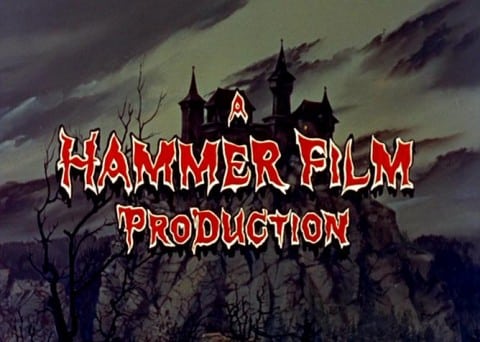
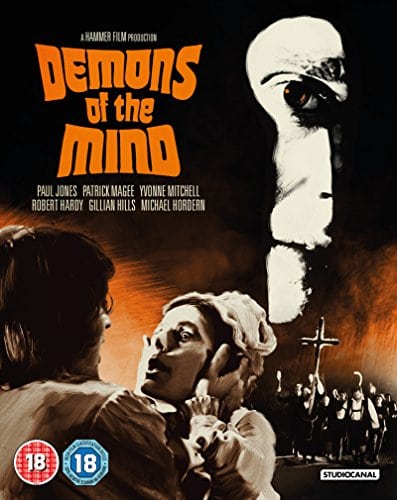
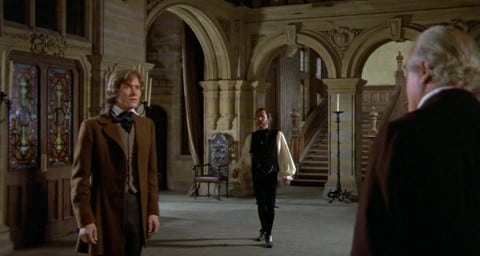
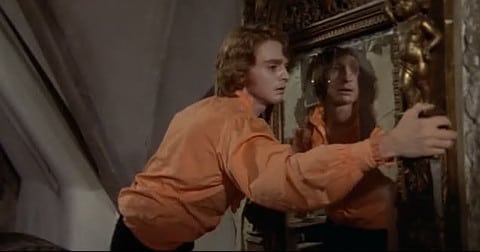

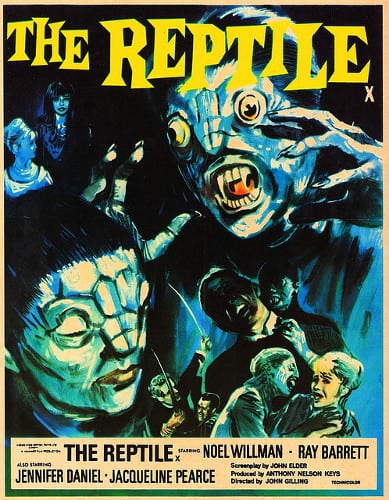
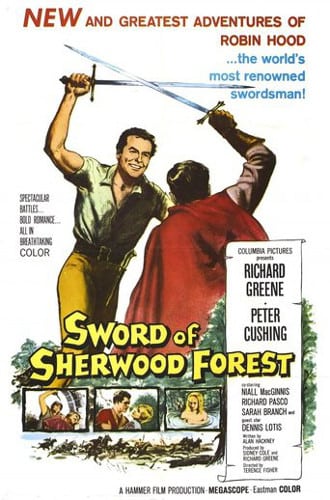
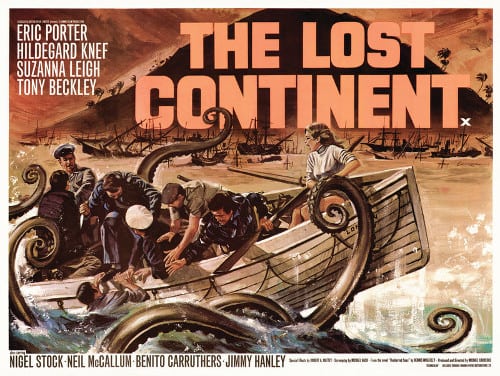
Be the first to comment